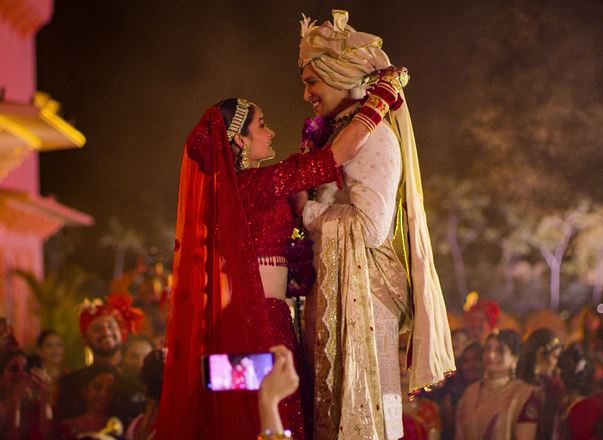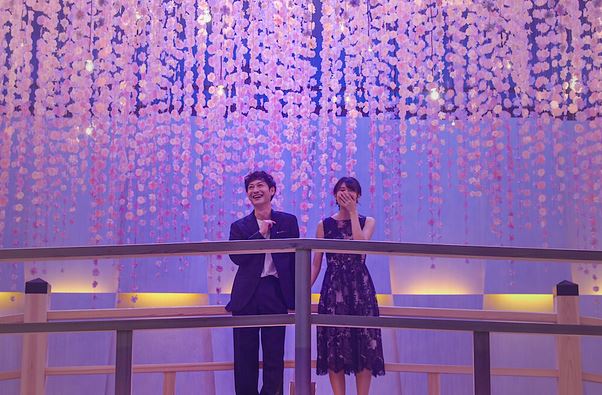By Jana Monji
Two Netflix reality series–one old and one new based on a successful US series–are now streaming: Love Is Blind: Japan and Indian Matchmaking Season 3. What can they tell us about love in 2020s? It isn’t easy and a successful TV series doesn’t mean successful matches.
Love Is Blind: Japan was released last year (8 February 2022), and is the Japanese version of US Love Is Blind which premiered Season 4 on 24 March 2023. At this point, the US version of Love Is Blind seems to have a greater success rate; two couples from season one are still married and together as of April 2023. The couples who married during Season 2 seem less happy. The two couples who married during Season 3 (Summer 2021) are also still married. The Japanese version also had two weddings. The Love Is Blind format is a group of men and women from the same metropolitan area date each other for 10 days without being able to see each other. After these dates, the couples can only meet when a marriage proposal has been accepted. The engaged couples then have a retreat together with the other engaged couples. The engaged couples meet the families and friends of their partners and plan the wedding. At the end, the engaged couples can either marry or decide to part ways.
The third season of Indian Matchmaking just began streaming on 21 April 2023. While the show can be a fascinating revelation about the romantic tribulations of the well-to-do Asian Indians in the US, India and Europe, there are a few caveats: Editing is everything and people behave differently in front of cameras.
Unlike the US-based Love Is Blind, the first season of Indian Matchmaking wasn’t as successful. According to a Los Angeles Times article, Netflix’s ‘Indian Matchmaking’ hints at happily ever after. Did the couples last? (18 July 2020), none of Season 1’s couples made it to matrimony.

Series director, Smriti Mundhra is an Asian Indian American filmmaker based in Los Angeles. She won the 2017 Tribeca Film Festival’s Albert Maysles New Documentary Director Award for her first feature-length documentary film, A Suitable Girl, which she co-directed with Sarita Khurana. That film was about three women in the Asian Indian community going through the marriage process and that eventually led to Indian Matchmaker.
Born in Los Angeles, her father, Jag Mundhra, is also a filmmaker, and Smriti was raised between Los Angeles and Mumbai. Her documentary short, St. Louis Superman was nominated for the 92nd Academy Award in 2020.
Her series Indian Matchmaker is thus both a good fit for Women’s History Month and Asian Pacific Islander Heritage Month. The series centers on the efforts of Mumbai-based matchmaker Sima Taparia to find matches for a variety of people. (Taparaia’s daughter was one of the trio featured in Mundhra’s A Suitable Girl.) How casting was done and the intrusiveness factors into what we see.
Ravi Guru Singh, who was seen on the second episode of the first season answered an advertisement on Backstage.com, which is an industry publication for casting films, television and entertainment. Singh, a lawyer working in NYC, understood all the contracts and was somewhat resistant to losing control of his story, writing, that after his first date with Nadia, “I didn’t move forward, largely because I did not want to give Hollywood producers the right to tell my love story without any of my input.”
More importantly, Singh wrote:
…when I finally saw the date ― or at least how it was portrayed on the show ― I almost broke down. My friends texted me things like, “Netflix played you” and “they made you look antisocial.”
Moreover, the series has been criticized for lacking diversity because it doesn’t show couples who are Muslim, Christian or Dalit. Season 3 attempts to address one aspect of this criticism by including clients who are Muslim. We get to meet the founders of South Asian dating apps (Dil Mil and SingleMuslim.com). In this respect, we do get a discussion about the problems of modern dating and the viewer can decide the advantages and disadvantages of having a matchmaker versus using a dating app.
This season, Taparia starts in London, but does have clients in the US, with a trip to California. As with previous seasons, Taparia is blunt about the problems she see with her clients. It boils down to wanting too much (the perfect fit to their want list) and, in this season, some problems with cutting the cord. One client seems too dependent upon her parents.
Taparia is easy to like. She seems warm and honest. But the success rate of the show’s participants could be seen as problematic. If she is a successful matchmaker, then perhaps the problem is in the lack of privacy or the very character and motivations of those who choose to participate in the show. Both
Indian Matchmaking and Love Is Blind seem to emphasize the family over the individual although Love Is Blind puts more focus on the individuals. Family or group dynamics are something that Indian and Japanese cultures put more emphasis on than US or UK majority cultures do.
As someone who knows people who were married through a matchmaker in Japan, I find the Japanese Love Is Blind sweet, but I haven’t watched the US version so I can’t compare. Love Is Blind also has an advantage over Indian Matchmaking by geotargeting. Traveling across the country or to a different country for a date or meeting the family raises other issues.
As an outsider to the Asian Indian community, I found the questions and concerns of both individuals and family interesting and I thought I learned something about Indian culture. There’s a definite feeling that Taparia’s clients are sometimes confused and caught between the culture of their parents and the majority culture of the country they’ve been raised in and that makes it harder to find marital happiness. It’s hard to determine what the exact problem behind diversity is: Lack of diversity in clients or lack of willing clients to go on camera, particularly after reading Singh’s experience.
Like any reality show, be aware that you’re not seeing everything but what we do see tells us something about changing culture and having the representation of faces of Asian descent and presenting their specific concerns, is ultimately a good thing.
AsAmNews is incorporated in the state of California as Asian American Media, Inc, a non-profit with 501c3 status. Check out our new TikTok account. Find additional content on Instagram , Twitter and Facebook. Please consider interning, joining our staff, or submitting a story, or making a tax-deductible donation. We are committed to the highest ethical standards in journalism. Please report any typos or errors to info at AsAmNews dot com.




